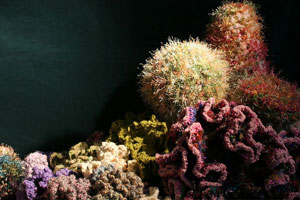 The Hyperbolic Crocheted Reef Project, made of crocheted contributions from hundreds of craftswomen (and a few men) around the world, will be introduced to the University of Wisconsin-Madison Thursday, March 31.
The Hyperbolic Crocheted Reef Project, made of crocheted contributions from hundreds of craftswomen (and a few men) around the world, will be introduced to the University of Wisconsin-Madison Thursday, March 31.
Project co-founder Margaret Wertheim, co-founder of the Institute for Figuring (IFF), presents the Ruth Ketterer Harris Lecture at 5:30 p.m. in the Ebling Symposium Center in the Microbial Sciences Building, 1550 Linden Drive. In a program that is free and open to the public, she will discuss the project and how it links math, marine biology, a traditionally feminine handicraft and environmental activism.
Wertheim and her twin sister, Christine, a scholar-artist, founded the Los Angeles-based IFF to advance the esthetic appreciation of scientific concepts. In this case, crocheting is the only way scientists know to model hyperbolic space, or the geometry that shows an infinite number of lines can pass through a given point and never meet. In nature, corals, kelps, sponges and frilly vegetables such as lettuce are models of hyperbolic space.
The crochet project also draws attention to the plight of environmentally distressed coral reefs around the world.
Instead of creating another think tank, Wertheim said in a lecture for TED, a nonprofit organization that shares “ideas worth spreading,” that she and her sister wanted to create a play tank when they founded the Institute for Figuring. It is a place, she said, “where people can go and engage with great ideas … not just through purely cerebral algebraic symbolic methods but by literally, physically, playing with ideas.”
For more information about the lecture and the project, visit Helen Louise Allen Textile Collection or e-mail [email protected].
